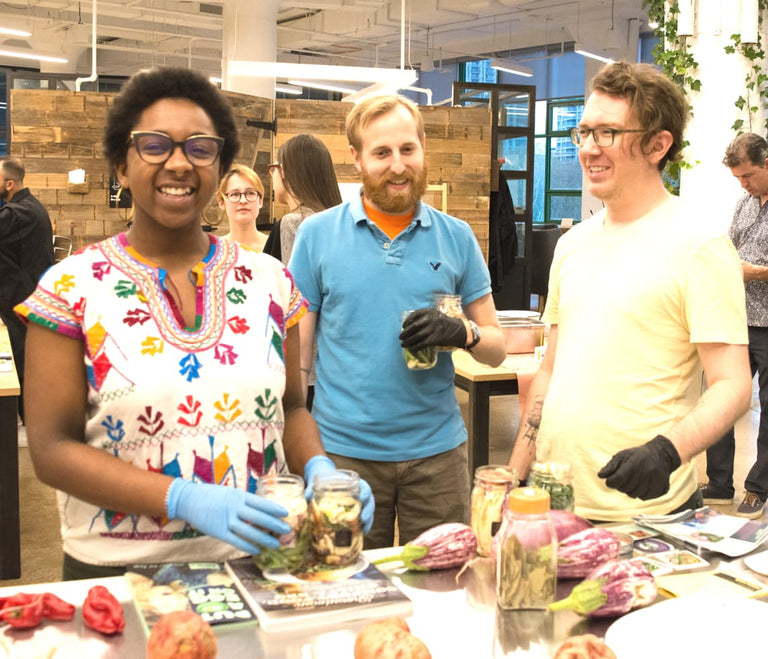Why seasonal eating actually(!) matters
by: Sophie Neuhaus
Tomatoes and corn in the summer, apples and squash in the fall - seasonal eating is already built into many people’s diets and cultures, whether they realize it or not. A lot of us eat certain foods in season because that’s when they taste their best, some of us do it because those ingredients are what’s most available and therefore the least expensive, and some of us may just eat seasonally out of habit. Whatever the reason, seasonal eating is not just reserved for warm summer berries or pumpkins in the fall - seasonal eating all year round can actually improve your health and your environment.

Experience Ingredients Grown in their Prime
Like ice cream on a hot summer day or hot cocoa on a cold evening, seasonal produce tastes superior when it’s grown and eaten in an environment that brings its very best qualities. Unlike out-of-season produce, which is often picked early, kept in cold storage for months (to ensure supply in the off-season), or shipped in from around the world, in-season produce is grown and harvested when climatic conditions are just right. These varieties become available once they’ve reached peak ripeness; this shorter span of availability means that your produce is fresher, more nutritious, and more flavorful than fruits and veggies eaten outside of their prime growing season.
No Need to Sacrifice Flavor or Nutrition
Studies show that the nutrient availability of produce (how much your body can access and utilize the nutrients in food) is highest right after harvest, and then starts to decline. Similarly, plants need their environments to grow, so when your produce is cut off from its natural environment prematurely, it’s unable to fully absorb all its necessary nutrients. Since seasonal produce is less likely to be picked early and left to ripen in storage or transport, you can trust that it was harvested at its peak. As such, all of the plant’s nutrients have had ample time to develop and become more available for consumers to absorb. Additionally, the less time it takes to get your food to you, the fresher, and therefore the more nutritious, it will be. Studies show that ascorbate (a major antioxidant) in spinach is reduced by over 50% after 10 days of storage, and folates (B vitamins) can be reduced by up to 30% after just 2 hours at room temperature. When picked and eaten at its very best, seasonal produce not only tastes better, but is also better for you.
Eat the Rainbow
Eating seasonally means your diet changes from month to month (or season to season) based on what’s growing and available at the time. Instead of eating the same foods and the same nutrient profiles all year long, seasonal eating helps you maintain a diverse diet. “The microbiome definitely changes as the seasons do,” says Bagnulo. “In the summer, you’re likely to have bacteria in your gut that thrives on raw vegetables, while in the winter, you may have bacteria that’s more geared toward starchy foods.” Seasonal foods mimic our bodies’ natural metabolic rhythms, and eating them helps fulfill your nutritional needs. Many cultures and medicinal philosophies encourage seasonal eating for a variety of reasons, but at its core, eating with the seasons enables you to get a wider variety of nutrients that you may otherwise be missing, and ensures a more well-rounded and complete diet. This can help combat nutritional deficiencies and improve overall health, not to mention expand your palate and produce knowledge. Studies have also shown that human microbiomes change in accordance with the seasons, and that eating seasonally can help promote proper gut bacteria and improve health.

Shrink Your Environmental Footprint
The longer your produce sits around waiting to get to you, the less nutritious it will be when it finally arrives. But eating out of season can also negatively impact your health in another, often hidden way. Storing and transporting food requires a lot of energy and has a major impact on the environment: food transport contributes to overall carbon and other GHG emissions, especially if your food is being flown or shipped. This pollution impacts air quality, water quality, and drives resource degradation, all of which, as you’ve probably guessed, can have serious consequences for human health.
Be a Friend to Your Farmers
Eating seasonally, coupled with striving to eat locally, reduces travel and storage outputs and enables farmers to take better care of their land. When there is demand for seasonal, local produce, farmers are encouraged to grow crops that are more compatible with their environments, instead of having to manipulate them to grow more lucrative or commonly-eaten produce. Plus, growing a diverse array of crops helps farmers improve their soil quality, which in turn helps produce more delicious food! By eating seasonally and locally, you’re also helping to support responsible and sustainable agricultural practices, and the people that employ them.

Eating seasonally is a delicious way to improve your diet and benefit your environment, but like anything related to food, it’s important to not get too extreme. In today’s food system, it’s increasingly difficult to eat 100% seasonally and locally, and for some people, that may not be an accessible option at all. It’s important to make the choices that are best for you with as much information as possible. If you’re ready to explore the best flavors of the season, checkout out our lists of the local varieties of fruits and veggies that our partner farmers are growing for New Yorkers like you.
Want to learn more? Check out our event on the Healing Benefits of Seasonal Eating, Tuesday, March 26th!
Rather have a taste first?
Local Roots Experiences are fun, pop-up events where we bring the farm to you!

Become a Harvest Club Pick Up Location
Are you a NY based cafe, bar, or neighborhood business? Become a Harvest Club pick up location and have community members come to your establishment each week to pick up their Local Roots harvest.
Top





